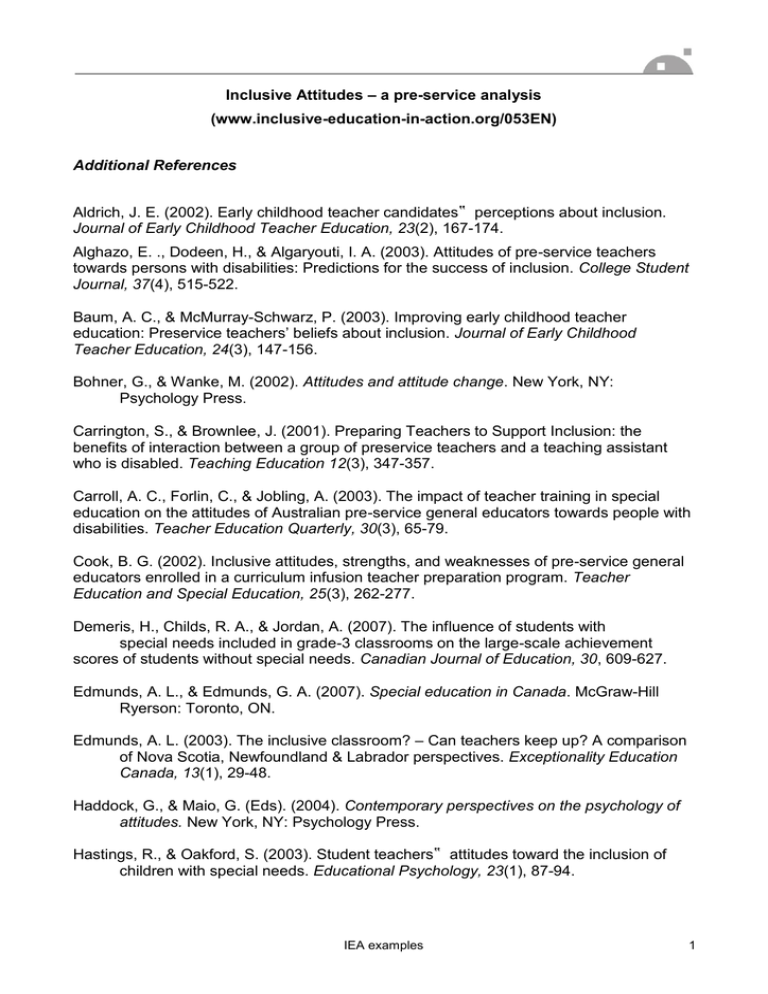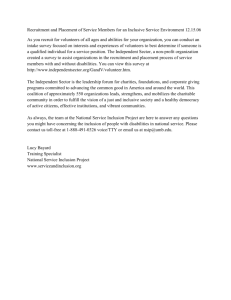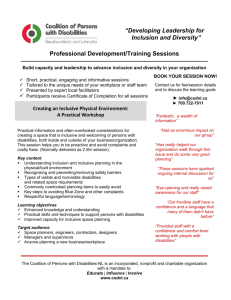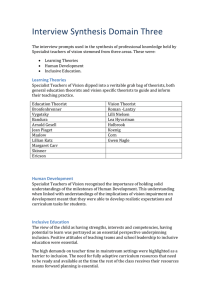
Inclusive Attitudes – a pre-service analysis
(www.inclusive-education-in-action.org/053EN)
Additional References
Aldrich, J. E. (2002). Early childhood teacher candidates‟ perceptions about inclusion.
Journal of Early Childhood Teacher Education, 23(2), 167-174.
Alghazo, E. ., Dodeen, H., & Algaryouti, I. A. (2003). Attitudes of pre-service teachers
towards persons with disabilities: Predictions for the success of inclusion. College Student
Journal, 37(4), 515-522.
Baum, A. C., & McMurray-Schwarz, P. (2003). Improving early childhood teacher
education: Preservice teachers’ beliefs about inclusion. Journal of Early Childhood
Teacher Education, 24(3), 147-156.
Bohner, G., & Wanke, M. (2002). Attitudes and attitude change. New York, NY:
Psychology Press.
Carrington, S., & Brownlee, J. (2001). Preparing Teachers to Support Inclusion: the
benefits of interaction between a group of preservice teachers and a teaching assistant
who is disabled. Teaching Education 12(3), 347-357.
Carroll, A. C., Forlin, C., & Jobling, A. (2003). The impact of teacher training in special
education on the attitudes of Australian pre-service general educators towards people with
disabilities. Teacher Education Quarterly, 30(3), 65-79.
Cook, B. G. (2002). Inclusive attitudes, strengths, and weaknesses of pre-service general
educators enrolled in a curriculum infusion teacher preparation program. Teacher
Education and Special Education, 25(3), 262-277.
Demeris, H., Childs, R. A., & Jordan, A. (2007). The influence of students with
special needs included in grade-3 classrooms on the large-scale achievement
scores of students without special needs. Canadian Journal of Education, 30, 609-627.
Edmunds, A. L., & Edmunds, G. A. (2007). Special education in Canada. McGraw-Hill
Ryerson: Toronto, ON.
Edmunds, A. L. (2003). The inclusive classroom? – Can teachers keep up? A comparison
of Nova Scotia, Newfoundland & Labrador perspectives. Exceptionality Education
Canada, 13(1), 29-48.
Haddock, G., & Maio, G. (Eds). (2004). Contemporary perspectives on the psychology of
attitudes. New York, NY: Psychology Press.
Hastings, R., & Oakford, S. (2003). Student teachers‟ attitudes toward the inclusion of
children with special needs. Educational Psychology, 23(1), 87-94.
IEA examples
1
Heward, W.L. (2000). Exceptional Children: An Introduction to Special Education.
Prentice-Hall Inc. New Jersey.
Jeon, H., & Peterson, C. A. (2003). Preservice teachers‟ attitudes toward inclusion: Early
childhood education and elementary education programs. Journal of Early
Childhood Teacher Education, 24(3), 171-180.
Jordan, A., & Stanovich, P. (2004). The beliefs and practices of Canadian teachers about
including students with special needs in their regular elementary classrooms.
Exceptionality Education Canada, 14(2‐ 3), 25‐ 46.
Jordan, A., & Stanovich, P. (2001). Patterns of teacher‐ student interaction in inclusive
elementary classrooms and correlates with student self concept. International
Journal of Disability, Development and Education. 48, 43‐ 62.
Kohlberg, L. (1976). Moral stages and moralization: The cognitive-developmental
approach. In T. Lickona (Ed.), Moral development and behavior: Theory, research,
and social issues (pp.31-53). New York: Holt, Rinehart and Winston.
Likert, R. (1932). A technique for the measurement of attitudes. Archives of Psychology,
140.
Lupart, J.L., & Webber, C. (2002). Canadian schools in transition: Moving from dual
education systems to inclusive schools. Exceptionality Education Canada, 12(2), 7–52.
Mdikana, A., Ntshangase, S., & Mayekiso, T. (2007) Pre-service educators’ attitudes
towards inclusive education. International Journal of Education, 22 (1), 125-131.
Naylor, C. (2004). How teachers in Coquitlam and Nanaimo view Special Education and
ESL services. Vancouver: B.C. Teachers’ Federation.
http://www.bctf.ca/education/InclusiveEd/ResearchProject/dc/SurveyReport.html
Naylor, C. (2005, November). Inclusion in British Columbia’s public schools always a
destination and never a journey. Paper presented at the Canadian Teachers’
Federation conference, Building Inclusive Schools: A Search for Solutions. Ottawa,
ON.
Niemeyer, J. A., & Proctor, R. (2002). The influence of experience on student teachers‟
beliefs about inclusion. Journal of Early Childhood Teacher Education, 23(1), 49-57.
Ontario College of Teachers. (2005). Standards of practice for the teaching profession.
Toronto, ON: Author.
Roeher Institute. (2004). Inclusive policy and practice in education: Best practices for
students with disabilities. Toronto.
Rothstein, L.F. (2000). Special Education Law (3rd ed.). Addison Wesley Longman. New
York.
IEA examples
2
Salend, S.J. (1999). So what’s with our inclusion program? Evaluating educators’
experiences and perceptions. Teaching Exceptional Children, 32(2), 46-54.
Santrock, J. W. (2003). Children. (7th ed.) Boston: McGraw Hill.
Scruggs, T., & Mastropeiri, M. (1996). Teacher perceptions of mainstreaming/inclusion.
Exceptional Children, 63(1), 59-72.
Shade, R. A., & Stewart, R. (2001). General education and special education pre-service
Teachers’ attitudes 182 toward inclusion. Preventing School Failure, 46(1), 37-41.
Shippen, M. E., Crites, S. A., Houchins, D. E., Ramsey, M. L., & Simon, M. (2005).
Preservice teachers‟ perceptions of including students with disabilities. Teacher
Education and Special Education, 28(2), 92-99.
Spencer J. S. (2005). Creating inclusive classrooms: Effective and reflective practices for
all students, (5th ed.) Boston, MA: Merrill.
Stanovich, P., & Jordan, A. (2004). Inclusion as professional development. Exceptionality
Education Canada, 14(2‐ 3), 169‐ 188.
Timmins, V. (2004). Pre-service training/teacher professional development. Presented at
theNational Summit on Inclusive Education, Ottawa, November 24–26
http://www.cacl.ca/english/natconf/2004/conferencesummary.html
Underwood, K. (2004, November). The case for inclusive education as a social
determinant of health. Paper presented at the Meeting of Comparative Program on
Health and Society. Toronto, ON.
UNESCO, (June, 1994) The Salamanca statement and framework for action on special
needs education. World Conference on Special Needs Education: Access and
Quality Salamanca, Spain.
Vanderfaeillie, F., De Fever, F., & Lombaerts, K. (2003). First-year university students
educational sciences 185 on inclusive education: Attitudes and convictions in Flanders.
European Journal of Teacher Education, 26(2), 265-277.
Wilczenski, F. L. (1995). Development of a scale to measure attitudes toward inclusive
education. Educational and Psychological Measurement, 55(2), 291-299.
Winzer, M. (2008). Children with exceptionalities in Candian classrooms. (8th ed.) Toronto,
ON: Pearson-Prentice Hall.
IEA examples
3




